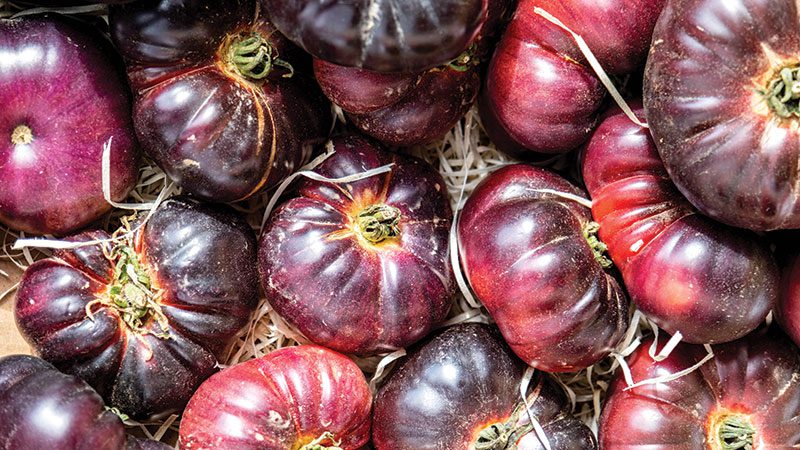The Cherokee Purple puzzle: Should we rename famous seeds?
By Rebekah Denn
This article was originally published in July 2022

What’s in a name? For seeds, an unintentional legacy of harm
The Cherokee Purple is one of the most popular varieties of heirloom tomato—big and bulgy, with a rich and beautifully balanced flavor. Craig LeHoullier, who introduced the variety to a wide audience, feels great pride about the dusky fruit, along with one serious regret: its name.
LeHoullier, a tomato expert and gardening author recounted at a conference recently how he opened his mail one day in 1990 to find a handful of tomato seeds from a fellow fan who thought he’d appreciate them. The man told LeHouiller that the seeds came from a neighbor whose family had grown them for more than a century after originally receiving them from the Cherokee tribe.
“I’m four years into seed saving, I’m very excited about discovering different colors and flavors and varieties,” LeHoullier recently recalled about his first contact with the plant. “And I had something that was just wonderful…I thought, this is great. I have to get it out there. People need to grow it, they need to try it. So I rather flippantly, I guess, gave it a name—Cherokee Purple—because it was a purple tomato and reflected what was stated in the letter.”
With hindsight and with more current cultural awareness, LeHoullier thinks the tomato shouldn’t carry that name without knowing more about its origins. Was it, in fact, handed down from the tribe? Would members support or oppose the name? Did they have another name for the variety, and would they want it shared?
The Cherokee Purple is far from the only food carrying such complicated questions. LeHoullier and others discussed the issue at a session of the Organic Seed Alliance’s Organic Seed Growers Conference earlier this year on “The Power of Seed Names: Can We Do Better?”
While seed names can be a beautiful connection to identity, culture, worldview and history, organizers wrote, “many seeds have names that are derogatory in nature or simply incorrect.
“How do we as an organic seed community honor seeds, their stewardship history, and where they have come from while addressing seed names that may need to change?”
The seed question is one facet of a question that’s also been raised recently in other areas, notably place names. Washington state lawmakers began a renaming process for state maps in 2015. Earlier this year the U.S. Department of the Interior announced candidates to rename more than 660 geographic features nationwide that had the name “squaw” after officially declaring it a derogatory term.
It’s a particularly fraught issue with seeds because by their nature they’re meant to be reproduced.
Kellee Matsushita-Tseng, assistant farm manager for the Farm Garden at the University of California at Santa Cruz, also works with Second Generation Seeds, a collective devoted to preserving and improving crops significant to Asian American communities.
Sometimes she and her colleagues can choose not to grow varieties that have objectionable names. But some they want to grow for specific educational or research needs.
“And so, if we use those varieties, I feel like I have no choice but to rename them…” she said at the Alliance meeting.
“For me the most dangerous risk is that if we do not rename then, or we do not make it clear (they are offensive), our learners and our students internalize these things, (thinking) that’s the way things are and that it’s acceptable.”
“The language we use, our naming, our choices, are all telling a story, whether or not we’re actually seeing that.”
For the alliance, it’s the start of a conversation, with more solid plans to follow.
“I think the humility part is me bringing these stories to you, essentially saying, Help. What do we do with this? Where do we go next?…” said LeHoullier.
“Can we complete the story that is so incredibly, disappointingly incomplete?”
